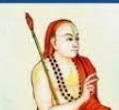
COMPOSER Narahari Teertha |
|
|||||||||||||
|
Shri Narahari Teertha was the second after Shri Madhwacharya and a great scholar in Girvana Bhasha. With his scholarly knowledge he preached and popularized Bhagavatha Dharma not only through the vedic knowledge but also through Hari Kirthans which he composed. This had great impact on the society at that time causing socio-religious renaissance. Shri Narahari Teertha had royal privileges. Shri Narahari Teertha was presumably from Andhra or Orissa.
There is no reliable information about his early life and career. A short praise of 13 Sragdharas called Narahariyati Stotra professes to give full details of his life. But this is legendary and late in date and hence unreliable for historical purposes. Tradition has been persistent, however that he was, for sometime Minister in Kalinga. The Narahariyati Stotra and some other works also allude to his ministry which is said to have lasted twelve years.
The fact of ministry is confirmed by the evidence of inscriptions from Srikurmam and Simhachalam temples. The Narahariyati Stotra makes out that he went to Kalinga at the orders of his Guru, Shri AnandaTeertha (Shri Madhwacharya), to procure the idols of Moolarama and Moola Sita (which have a legendary history) which happened then to be in the state treasury of Kalinga. An opportunity presented itself when the Kalinga King died. His ministers, in time honored fashion, sent out the state-elephant to pick up and bring them a proper regent. By some stroke of luck, the choice of the elephant fell on Shri Narahari Teertha and he was anointed on the throne. After 12 years when the Prince came of age, he relinquished his office.
The King, in gratitude, bade him choose any presents he would like and the monk asked for the idols, the sole reason for his visit to kalinga and acquired them. These he presented to Shri Madhwacharya. The Matsya rules of Oddavadi became independent of the Gangas and chose Vaishnavism under the influence of Shri Narahari Teertha. Arjuna became Narasimha Vardhana, Annamaraja Gopalavardhana and Munjaditya Shrirangavardhana. Shri Narahari Teertharu was also responsible for the conversion of many princely and aristocratic families of Kalinga and Andhra regions to Madhva fold. The descedents of these families still flourish in the coastal Andhra and adjoining states.
The earliest HariDasa (popular cult of great souls who dedicated their entire life in singing the glories of lord Narayana) of whom we have definite information is Shri Narahari Teertha. He has already been mentioned as one of the direct disciples of Madhwacharya. Madhwacharya himself is believed by some to have left a few songs in Kannada
|
||||||||||||||




